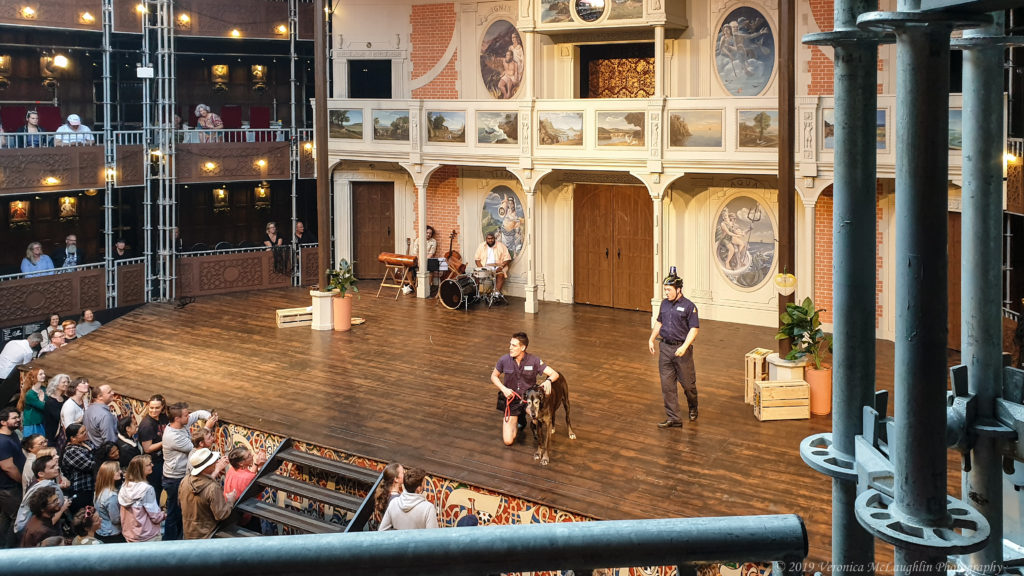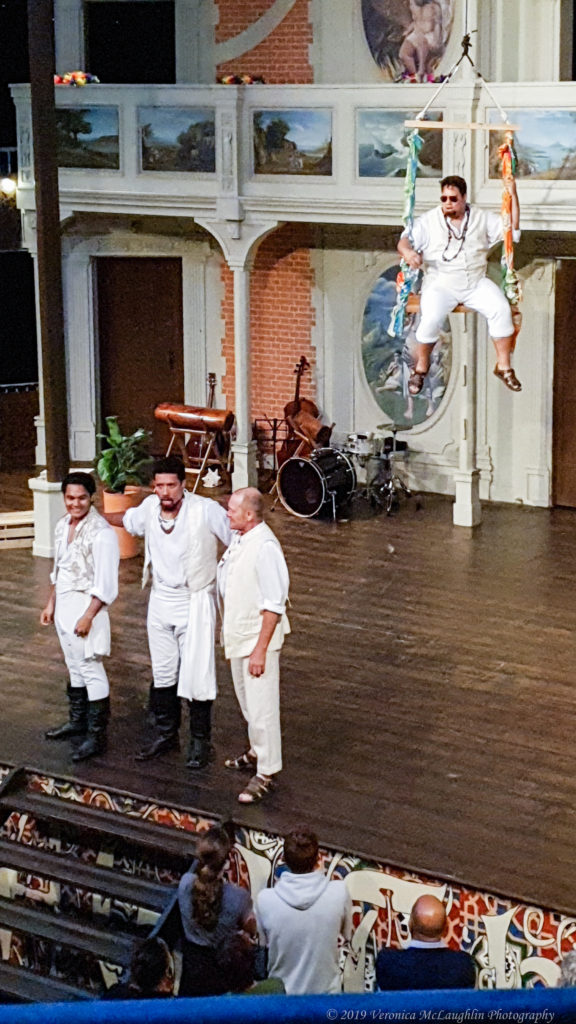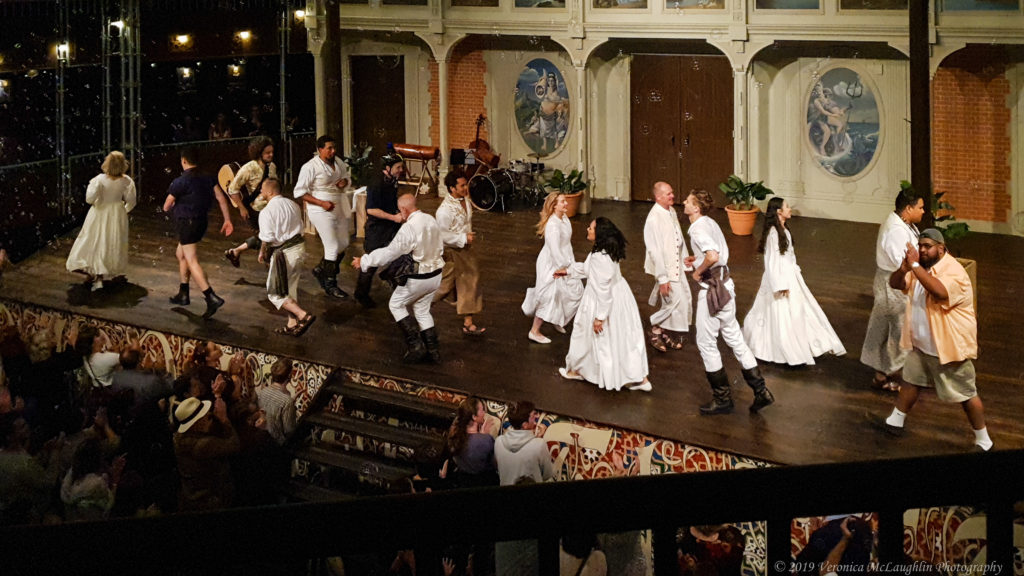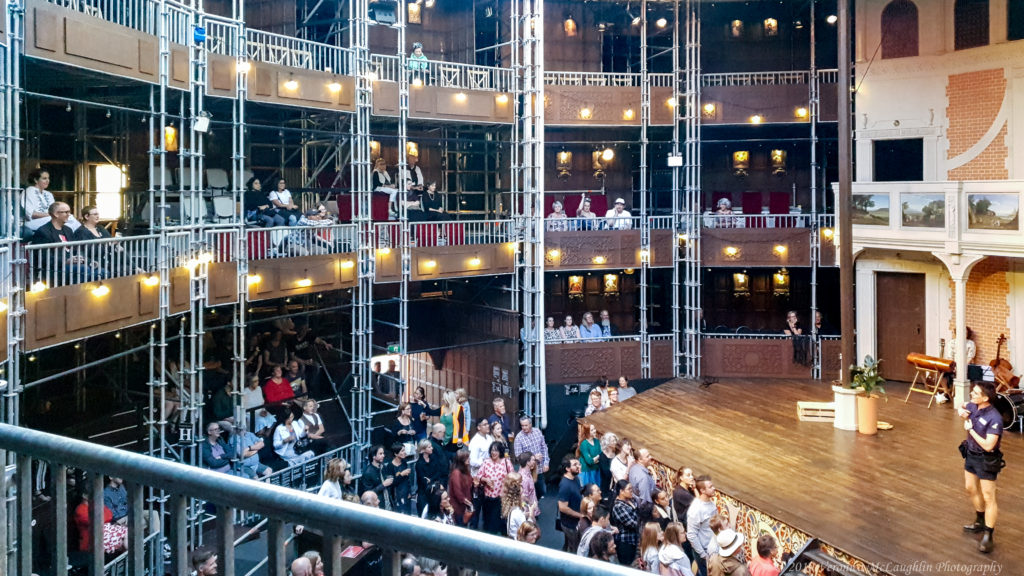Much Ado About Nothing at Pop-up Globe, 14 December 2019: Theatre Review
William Shakespeare’s Much Ado About Nothing opened at Pop-up Globe on Saturday night, a performance that brought the Bard’s ribald comedy to giddy heights.
 One could not hope for a more perfect evening to visit Pop-up Globe. Though the weather gods had promised rain, the air was warm and still, perfect for strolling through the glittering garden with a glass of wine before taking our seats in the theatre itself. The Pop-up Globe is a painstaking recreation of Shakespeare’s own second Globe theatre, but instead of wood, it is made of modern scaffolding, with three levels of seating and standing room only for Groundlings who pay a mere $10 for the privilege of both watching the performance and inevitably taking part in the proceedings.
One could not hope for a more perfect evening to visit Pop-up Globe. Though the weather gods had promised rain, the air was warm and still, perfect for strolling through the glittering garden with a glass of wine before taking our seats in the theatre itself. The Pop-up Globe is a painstaking recreation of Shakespeare’s own second Globe theatre, but instead of wood, it is made of modern scaffolding, with three levels of seating and standing room only for Groundlings who pay a mere $10 for the privilege of both watching the performance and inevitably taking part in the proceedings.
 The show opens with constable Dogberry (Tom Wingfield) and his deputy Verges (Darcy Kent), along with their sidekick, the most agreeable pooch on the planet, warming up the audience with a bit of Elizabethan slapstick and engaging the crowd in a call-and-response of “You can’t bring bananas!” Settling into policework, they stumble into an unfolding crime.
The show opens with constable Dogberry (Tom Wingfield) and his deputy Verges (Darcy Kent), along with their sidekick, the most agreeable pooch on the planet, warming up the audience with a bit of Elizabethan slapstick and engaging the crowd in a call-and-response of “You can’t bring bananas!” Settling into policework, they stumble into an unfolding crime.
Don Pedro (James Maeva) and his army is arriving in Messina (an island somewhere in the South Pacific), having defeated his bastard half-brother, Don John (Greg Johnson) in battle. He is staying with the wealthy Leonato (Stephen Lovatt), father of the fair maiden Hero (Jess Hong) who is fancied by Don Pedro’s protégé Claudio (Theo David.) When the young people meet, they fall in love and the wedding date is set.
Don John, unwilling to accept defeat at his brother’s hands, concocts a scheme to discredit Hero’s purity and ruin the wedding, engaging Borachio (Alexander Holloway) and Hero’s maid Margaret (Aruna Po-Ching) to stage a lovers’ tryst on the girl’s balcony, witnessed by Claudio and his companions – who don’t realise they’ve been duped.
 Meanwhile, the Lady Beatrice (Renee Lyons) and Benedic (Rutene Spooner) continue a long-running battle of wits. Having both sworn off marriage – they parry insults and taunts, but somehow never miss an opportunity to be in the same room. Their friends devise a scheme where each will “overhear” a conversation where they learn the other is madly in love with them and always has been. This involves some hilarious aerial acrobatics and delightful pratfalls as they are drawn into the supposed gossip.
Meanwhile, the Lady Beatrice (Renee Lyons) and Benedic (Rutene Spooner) continue a long-running battle of wits. Having both sworn off marriage – they parry insults and taunts, but somehow never miss an opportunity to be in the same room. Their friends devise a scheme where each will “overhear” a conversation where they learn the other is madly in love with them and always has been. This involves some hilarious aerial acrobatics and delightful pratfalls as they are drawn into the supposed gossip.
Hero’s dream wedding, staged in traditional South Pacific style, is ruined and she is disgraced when her beloved publicly accuses her, “She knows the heat of a luxurious bed!” when Friar Francis asks if any know an impediment to this marriage. The girl is distraught and her father, humiliated before the entire town, refuses to listen to her cries of innocence and wishes her dead.
At the Friar’s insistence, Leonato relents and with Hero’s friends and the services of Constable Dogberry plan a way to redeem her honour and bring Don John and his men to justice. But first they will announce that Hero has died.
Beatrice and Benedic finally confront each other and confess their love – and Beatrice extracts a promise from him that he will help avenge Hero and challenge Claudio to a duel.
The bumbling Dogberry and Verges (having somehow lost their wondrous dog) get to work solving the case, tracking down Borachio and forcing a confession. And from there all’s well that’s ends well…
 Except… while this is the broadest of comedies, full of piss and piss-takes throughout – it is hard to overlook one serious issue within the play itself. Yes, it is a product of its time and is no doubt intended as a morality play, a warning to any young woman who might be tempted into fornication – but it’s difficult to lightly accept that Hero’s only worth to her family lies in her chastity. Guilt or innocence is irrelevant if she is perceived to be unchaste and only death can redeem her. Of course, this is Shakespeare and the play is 400 years old, so far be it for me to suggest an edit – but this casts a shadow on the story. And while Hero is redeemed, what would become of her had she not?
Except… while this is the broadest of comedies, full of piss and piss-takes throughout – it is hard to overlook one serious issue within the play itself. Yes, it is a product of its time and is no doubt intended as a morality play, a warning to any young woman who might be tempted into fornication – but it’s difficult to lightly accept that Hero’s only worth to her family lies in her chastity. Guilt or innocence is irrelevant if she is perceived to be unchaste and only death can redeem her. Of course, this is Shakespeare and the play is 400 years old, so far be it for me to suggest an edit – but this casts a shadow on the story. And while Hero is redeemed, what would become of her had she not?
Fortunately, Hero’s tragedy takes a backseat to Beatrice and Benedic’s romantic comedy. Renee Lyons and Rutene Spooner thoroughly inhabit their combative lovers, bringing a joyful physicality and sheer whimsy to their roles. We love how they torment each other and cheer when then finally drop their walls of self-protection and admit their love. If trickery was required to achieve it – all praise to the tricksters!
 Director Miriam McDowell has directed this production almost as a series of set pieces, one comedy routine after the other. While this provides maximum laughs, especially from some of the acrobatic routines from Dogberry and Verges, who take an interval several times during the show, there seemed a strange lack of continuity – almost like a commercial break in the story. I laughed. I loved it. But there were times I wanted to just get on with it. The decision to reset the play in the South Pacific, incorporating the languages, dress and choreography was simple brilliance. There is no sense of discord as Shakespeare’s themes are universal and no less relevant here than in 16th century England.
Director Miriam McDowell has directed this production almost as a series of set pieces, one comedy routine after the other. While this provides maximum laughs, especially from some of the acrobatic routines from Dogberry and Verges, who take an interval several times during the show, there seemed a strange lack of continuity – almost like a commercial break in the story. I laughed. I loved it. But there were times I wanted to just get on with it. The decision to reset the play in the South Pacific, incorporating the languages, dress and choreography was simple brilliance. There is no sense of discord as Shakespeare’s themes are universal and no less relevant here than in 16th century England.
Chantelle Gerrard’s costumes capture the distinct local flavour and does Kasina Campbell’s gorgeous choreography. Paul McLaney clearly had a bit of fun transforming Shakespeare’s songs to the South Pacific.
Like all Pop-up Globe productions, Much Ado About Nothing presents Shakespeare as it was done in Elizabethan times – loud, bawdy and thoroughly engaging. This was more like a night at a comedy club than any BBC-produced period piece – the audience is part of the show and one is immersed in the magic of a living Shakespeare.
Much Ado About Nothing is playing until 1 March and word is there will be no extended season.
Book tickets HERE.
~Veronica McLaughlin
Note – cellphone photos were allowed during the show and I have included some of my shots here.